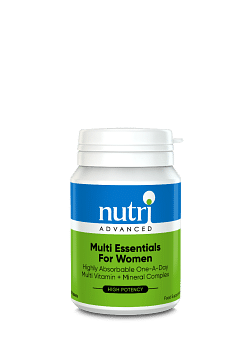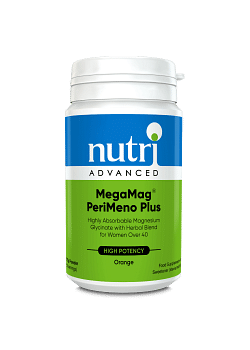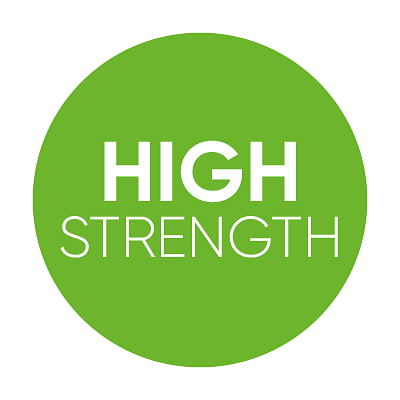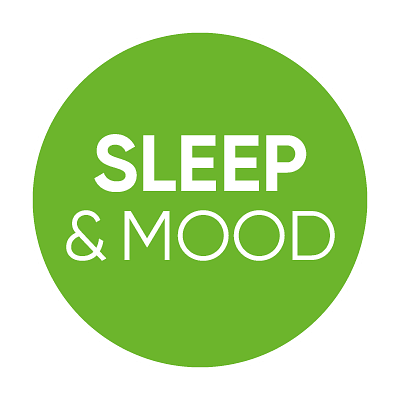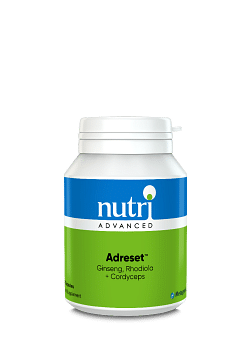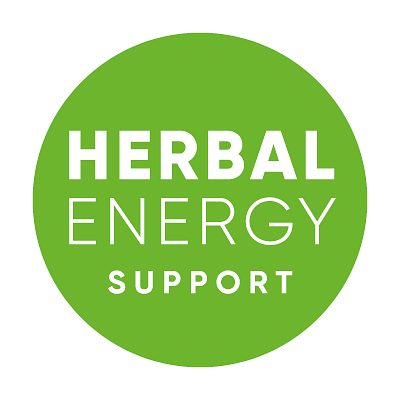An In-Depth Interview with Dr Ghazala Aziz-Scott: HRT, Bioidentical Hormones and Functional Medicine
Why you can trust Nutri Advanced Every article on our site is researched thoroughly by our team of highly qualified nutritionists. Find out more about our editorial process.
It was a privilege to spend an hour with Dr Ghazala Aziz-Scott chatting about HRT, bioidentical hormones and her functional medicine approach and vision for the future of women’s healthcare. Dr Aziz-Scott is a specialist in integrative women’s health and bioidentical hormone balancing for The Marion Gluck Clinic. She has vast knowledge and clinical experience, an infectious enthusiasm for her subject and an unwavering commitment to deliver the best care for her patients. We are very grateful to Dr Ghazala Aziz-Scott for being so generous with her time and sharing her knowledge on what can often be a very confusing and misunderstood subject. And for anyone struggling through the menopausal transition, we hope this article leaves you feeling educated, empowered and with a renewed sense of hope, safe in the knowledge that there are many different possibilities for support during this time.
“Hormones are the WiFi of the human body – chemical messengers that circulate in the blood stream to specific target cells linking all the organ systems, thus controlling every function of the body. Curiosity and awareness about hormonal health is growing as we realise its importance and how hormonal imbalances can impact our health at different stages of the life cycle. Education is key, and empowers women to make informed decisions that are right for them.”
- Dr Ghazala Aziz-Scott
RB: Thank you so much Ghazala for taking time to talk to us about what can often be a very confusing subject. Please can you start by telling us a bit about yourself, your approach and the areas of health you commonly support?
GA-S: For 25 years I was an NHS GP and practice partner, and for the last few years I’ve been training in functional medicine and bioidentical hormone replacement therapy (BHRT). Over the last two and a half years I’ve been working for The Marion Gluck Clinic, and during the last 6 months I’ve taken a sabbatical to really immerse myself in the practical application of functional medicine.
I’ve done the IFM (Institute of Functional Medicine) training, which is very useful, but it’s without doubt the practical experience of actually using functional medicine with patients in clinic that enables you to really join all the dots together.”
Now I’m in a unique position to bring together my knowledge and experience of bioidentical hormones, functional medicine and many years of experience as a GP. My approach is integrative and I use a functional approach to find the root cause of any given health issue.
“Even when I’m looking at hormones,
I’m always thinking about the bigger picture.”
Functional medicine recognises that all of our bodily systems are interconnected, so even when I’m looking at hormones, I’m always thinking about the bigger picture and make a personalised treatment plan that takes all of those things into consideration. You only get the best outcomes when you look at all bodily systems together as a whole, rather than looking at one part in isolation. I commonly support women in the following areas; peri-menopause and menopause, any kind of hormone imbalance, PMS (pre-menstrual syndrome), endometriosis, post-natal depression and PCOS (polycystic ovarian syndrome). I also provide specialist support for PMDD (pre-menstrual dysphoric disorder) and support men with andropause.
RB: RB: There is still so much confusion and uncertainty surrounding Hormone Replacement Therapy (HRT) – and women are frequently unsure what to do for the best – I appreciate this is a big question (!) but what is your current perspective on this?
GA-S: Concerns around using HRT came mainly as a result of the 2002 WHI (Women’s Health Initiative) Study which was stopped early due to safety concerns. Our knowledge and understanding on the safest forms and delivery methods of HRT has come a long way since 2002 but it is taking a long time for conventional medicine and general public opinion to catch up.
Rewind back to 2002, the WHI study used synthetic HRT with oral conjugated equine oestrogens (derived from the urine of pregnant mares) and synthetic progesterones or progestins. It was stopped early due to an increased risk of breast cancer, cardiovascular disease and strokes evidenced.
“The resulting media frenzy publicly distorted the image of HRT, before the study had even been looked at properly.”
Many women abandoned their treatment overnight and doctors became very reluctant to prescribe it. In retrospect, the study was poorly designed and had recruited women of older age with pre-existing health conditions. In addition, the study also used oral rather than transdermal routes of oestrogen treatment and synthetic progestins rather than progesterone.
In 2008, a meta-analysis published in the British Medical Journal revealed that oral oestrogen therapy increases the risk of blood clots 2 to 3 fold compared to transdermal treatment. The French E3N-EPIC study in 2005 assessed 55,000 women on HRT and found no increased risk of breast cancer with bioidentical oestrogen used alone or combined with oral micronized progesterone (OMP). A follow up in 2008 of over 80,000 women showed the breast cancer risk was highest in the group that took synthetic progestins, followed by oestrogen only, but there was ZERO increased risk with transdermal oestrogen and OMP.
“Incredibly, it took until 2015 for the NICE (National Institute of Clinical Excellence) NHS guidelines to reflect this research that transdermal bioidentical oestrogen and OMP (bioidentical progesterone) are the safest form of HRT.”
“These research findings have now also been recognised in the British Menopause Society Consensus Statement in 2019.”
There has been much media coverage about HRT and the menopause recently and the unfortunate lack of skill and experience in the NHS in supporting women with safe treatments. Whilst it’s a great tribute to our health service that body identical HRT is available on the NHS, accessing it can be problematic and sadly, synthetic HRT continues to be used extensively, contrary to scientific evidence. Premature menopause affects 1% of women under the age of 40 and 5% under the age of 45. This cohort of women particularly need HRT for its long term benefits including protection against osteoporosis, cardiovascular disease and dementia. Specialist NHS clinics, which are needed to provide this support, are scarce and often under-resourced.
I continue to come across women on oral and synthetic HRT preparations which are still available on the NHS and a significant number of women come to private bioidentical clinics such as The Marion Gluck Clinic to change to BHRT.
RB: Please can you explain how bioidentical HRT is different to synthetic HRT?
GA-S: Bioidentical (also referred to as body identical) hormones are identical in chemical and molecular structure to those occurring naturally in the human body, as opposed to ‘synthetic’ hormones which are structurally different.
“Bioidentical hormones therefore fit receptor sites on cells perfectly, like a lock and key, and the physiological effects are consistent with the normal responses of the human body with better tolerance and fewer side effects.”
This is not the case with ‘synthetic’ hormones, as we have seen consistently demonstrated and as far back as the 2002 WHI study. Bioidentical hormones although natural, are equally potent as human hormones so monitoring for safety is vital. Similar to the trend in plant-focused diets, there is an increasing demand for hormones obtained from plant sources that are bioidentical. Diogesin from wild yam and beta-sitosterol from soya beans are extracted into powders and then processed in compounding pharmacies to formulate bio identical hormone treatments or bioidentical hormone replacement therapy (cBHRT).
RB: How does the compounded bioidentical hormone replacement therapy (cBHRT) offered at The Marion Gluck Clinic differ from the regulated bioidentical hormone replacement therapy (rBHRT) available on the NHS?
GA-S: At The Marion Gluck Clinic we work closely with The Specialist Pharmacy to provide compounded bioidentical HRT (cBHRT). In simple terms this means we prescribe bioidentical hormones in a completely personalised dose for each individual. We can also offer a wider range of hormones if needed, not just oestrogen and progesterone, because, as we know, hormones such as DHEA and testosterone are important too. And we are fortunate to be able to offer a range of different delivery methods (transdermal creams, sublingual lozenges, vaginal creams, sublingual drops, rapid dissolve tablets) which is so important, because not everyone can tolerate the same delivery methods; for example, we know that some women don’t tolerate oestrogen well trans-dermally so we may choose a different delivery method instead. In addition, we can prescribe compounded bioidentical hormones for a range of hormonal health problems not just the menopause.
Body identical HRT refers to the regulated bioidentical HRT (rBHRT) available on the NHS in preset formulations to distinguish it from compounded bioidentical HRT (cBHRT). For rBHRT, women are given preset formulations of bioidentical oestrogen and progesterone.* Oestrogen is delivered as a patch or gel, and progesterone as oral micronized progesterone.
“For a woman who tolerates this treatment – it is excellent and it’s wonderful that we have body identical HRT on the NHS available for everybody. However, it doesn’t work well for everyone and that’s where the more personalised approach that we offer can be really helpful.”
RB: How does your overall approach to supporting clients differ from the NHS?
GA-S: Our approach is very different. If you present to your GP with menopausal symptoms over the age of 45 you will be typically treated without any blood tests. At The Marion Gluck Clinic, we will quantify in much greater detail and much more precisely, the treatment choice. We start with a 1hr consultation, do a range of testing and take a thorough case history to evaluate what the current picture is, which hormones are missing and then treat with personalised prescription.
“We go through all the options and optimise treatment to make sure each individual client is getting exactly what they need, including a complete holistic perspective of the diet and lifestyle steps they can take to improve their health.”
With the NHS it is less personalised, and you get less choice in terms of the BHRT dose you can take and the mode of delivery. We also do regular monitoring and safety checks for every client and I believe this is really important. This also means we can accurately recommend changes to treatment as and when needed.
Ironically, it now feels like there is a gradual shift to the model of care we have been practising at private clinics for decades. It is great to see an increased awareness of the menopause, more women talking about it in the mainstream media and changes to how it is supported in the workplace too. In the future, I would love to see this personalised approach as the standard of care for every woman seeking help, not just in the private sector.
“'Experience-based personalised medicine’ has just as important a role as ‘evidence based medicine’, especially given that research indicates a 17-year time lag for medical evidence to become standard medical practice.”
RB: What do you consider to be the benefits and contraindications of using bioidentical hormone replacement therapy?
GA-S: Benefits:
• Short-term symptomatic relief
BHRT can give symptomatic relief from what can often be very disabling symptoms, it thus has the potential to significantly improve quality of life for many women during the menopause.
• Long-term health benefits
In the longer term, we know that BHRT has positive impacts on brain health, bone health and cardiovascular health. General wellbeing and energy are often better when hormones are replaced. And women have a more youthful appearance.
• Sex hormones are not just for reproduction
We now know that sex hormones are not just involved in reproduction; but rather they have a much wider role to play in lots of different metabolic processes. And we also know that they’re linked with neurotransmitters in the brain – they’re not just sex hormones; they’re neuro steroids - oestrogen is linked with serotonin, testosterone is linked with dopamine and progesterone with GABA. This concept of cognitive decline and brain fog – it’s all very real. If you actually look at the structure of a neurone, both when a woman is taking oestrogen and not, there is a marked difference. And it definitely has a significant impact on long term quality of life.
• Life expectations at 50 have changed
The average age of menopause is 51, and yet average life expectancy has increased significantly since Victorian times. This means women are now spending a much bigger proportion of their lives in the menopause. Nowadays we have higher life expectations at 50; women are more confident, often have teenage children, ageing parents and are at the peak of their careers. I have seen how BHRT can help to support these higher life expectations.
Contraindications:
• History of hormonally-dependent breast cancer
In this case, you’d normally be advised to avoid HRT, unless you had disabling symptoms, however there are contrasting views and debate on this. For anyone interested in exploring this further, I have provided a link at the end to a useful book.
• Other oestrogen-dependent cancers
• Previous history of deep vein thrombosis (DVT) or a pulmonary embolism (PE)
• Recent heart attack
• Arterial thromboembolic disease
• Acute liver disease
RB: Can you share with us some of the diet, lifestyle, supplement and functional testing considerations you often recommend as part of your functional medicine approach?
GA-S: Looking at diet, lifestyle, supplements and using functional testing are all important aspects of our integrative approach. During our 20s and 30s we can get away with poor diet and lifestyle choices a bit more, but I have seen how the negative effects of these choices can really show up during the 40s and 50s.
“I think we really have to look after our bodies in our 40s and 50s, through healthy diet and lifestyle choices. Our general resilience and the body’s ability to repair and regenerate is declining and we need to provide it with more support.”
Dr Ghazala Aziz-Scott - Diet, lifestyle, supplement & functional testing considerations
DIET:
• Low glycaemic index Mediterranean style diet - wide variety of fruits and vegetables (6-8 portions daily) & at least 2 portions cruciferous vegetables daily
• Anti-inflammatory diet - this has a significant impact on chronic disease risk
• 2 tbsp organic milled flaxseeds or chia seeds daily
• Good quality protein
• Beneficial fats - nuts, seeds, avocados, extra virgin olive oil
• Phytoestrogenic foods - soya, legumes
• Phytonutrients - eating the rainbow
• Keep alcohol to a minimum - it is more of a struggle for the liver to detoxify alcohol during the menopause
• Gut health-supportive foods - soluble fibre, prebiotic & probiotic foods, plant food diversity
• Liver supportive foods - artichoke, beetroot, fennel, greens, onions, garlic, ginger
NB: Anti-inflammatory diet, liver support and gut health are key areas of focus whilst taking BHRT. In addition, I would really prioritise phytoestrogenic foods for women who are not taking BHRT.
LIFESTYLE:
• Range of different types of exercise - cardiovascular, resistance, strength training, flexibility
• Regular good quality sleep & stress management - are absolutely key
• Active relaxation every day - self-care rituals, meditation, breath work, anything that makes you happy, that you find relaxing and allows you to have some down time.
“Don’t forget the simplest things you can do to support your health. I think we’ve forgotten the simple things that really make a difference – and actually there’s a lot of very simple things we can do to be healthy that don’t cost money.”
SUPPLEMENTS:
I do often recommend nutrition supplements because many people simply aren’t getting all the nutrients they need from their diets and sadly, the overall nutrient quality of our food has gone down.
Supplements to consider for women taking BHRT:
• High quality multivitamin & mineral
• B complex
• Vitamin D3 & K2 drops - we always measure vitamin D and aim to keep it above 100 nmol/L
• Omega 3 fish oil - providing EPA & DHA
• Magnesium - especially for women who aren’t sleeping very well – I find magnesium can be very calming to the nervous system
Additional supplements to consider for women not taking BHRT:
• Comprehensive bone-support formula - including calcium, magnesium, boron & vitamin D
• Shatavari - to naturally support hormonal balance
• Bacopa - to support brain health
• Tribulus terrestris & maca - to naturally support testosterone and androgens
• Red clover, sage & black cohosh - to naturally support oestrogens
• Borage seed oil or evening primrose oil - may be useful for breast tenderness
Supplements to consider for more targeted adrenal support:
• Adaptogenic herbs: Ashwagandha, Rhodiola, Ginseng
• Magnesium
• B-complex
• Vitamin C
• Vitamin D
• Omega-3 fish oil
NB It’s crucial to look at the underlying cause of stress and evaluate whether a client may benefit from additional support such as psychotherapy. Acupuncture can be very helpful to support the adrenals and for hormone balance too.
FUNCTIONAL TESTING:
DUTCH Test
In the clinic, we will always look at a range of hormones in the blood. My favourite functional test however is the DUTCH test – I think it’s the most sophisticated way of looking at the balance of someone’s hormones, oestrogen metabolism and adrenal axis. This is my absolute favourite and I’ve done millions of them! If I’m recommending hormone treatment, I believe it’s important to first look at oestrogen metabolism pathways to check in on how well this is working. Everyone should have access to this information.
Nutrigenomics
Ideally, everyone should look at their nutrigenomics too, but obviously I have to consider each client’s individual budget and prioritise what’s most important. For example, if a client has a family history of breast cancer, I would definitely want to look into their nutrigenomics. This information can be incredibly helpful. It’s particularly important to look at SNPs on oestrogen metabolism pathways.
Functional nutritional testing (organic acids)
I often look into nutrition markers and organic acids; particularly those related to hormone balance, for example, B6 & B12 markers, glutathione and neurotransmitters.
“We can get such a comprehensive picture of what’s going on for each individual by using functional and nutrigenomic tests, and this is an area I would like to see grow. Testing empowers clients to make decisions that are right for them.”
RB: And finally, are there any useful resources you can share for anyone wanting to find out more?
Marion Gluck Clinic website, blog & books:
https://www.mariongluckclinic.com/
Dr Carrie Jones:
http://www.drcarriejones.com/
Book:
Estrogen Matters by Dr Avrum Blooming & Carol Tavris
References available on request.
Footnotes:
*Testosterone is available for women on the NHS too, but only in a transdermal form which is actually only licensed for men, so the strength per dose is too high for most women. Women are usually advised to use it say once or twice a week – which is very unscientific. It’s very difficult to achieve an optimal individualised dose this way. In contrast, in the compounded world, we can prescribe a personalised dose of testosterone which is optimal for each individual.
This website and its content is copyright of Nutri Advanced ©. All rights reserved. See our terms & conditions for more detail.
Nutri Advanced has a thorough research process and for any references included, each source is scrutinised beforehand. We aim to use the highest value source where possible, referencing peer-reviewed journals and official guidelines in the first instance before alternatives. You can learn more about how we ensure our content is accurate at time of publication on our editorial policy.
Most Popular Articles
-
7 Surprising Ways To Support Your Magnesium
If you are displaying signs of a magnesium deficiency, here are 7 ways to boost your magnesium levels that are easy to incorporate into your daily life. -
5 Best Vitamin C Supplements Picked By Our Experts
Learn more about the different types of vitamin C, the different benefits you get from different types, and what you get for spending more on a good supplement. -
Top 5 Vitamins For Energy And Tiredness Picked By Our Experts
The 5 best and most important vitamins for energy & tiredness including B vitamin food sources & best supplement forms for energy. -
Benefits of Myo-Inositol for Polycystic Ovary Syndrome (PCOS)
In this research review article, we take a closer look at a lesser-known natural compound called myo-inositol that has been found to have significant potential to improve many of the prevalent features of PCOS. -
Top 10 Reasons to Give Your Kids Omega-3
Read the top 10 reasons that kids should have plenty of Omega-3- an essential fatty acid- including for depression, brain function, sleep & reading/maths skills.



